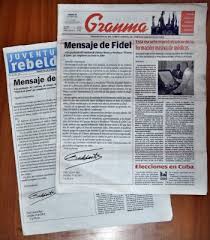 On March 14, the Cuban press spent another day with more grief than glory. Like previous years, some media guerrillas pledged to do more critical journalism. I wonder with whom. With society and grassroots leaders? So not fair! To criticize anyone but those responsible for the devastation of Cuba seems to be the motto of the soldiers of the media, because nobody wants to jeopardize their job and perks, which translated back to 1959 Cuban means, “let death take another.” The key is given by the fifty-five years of the of the Castro dictatorship in general and by the forty-seven of the original dictator, who left the national caudillista scar of “as I say,” in a trail of verbal violence, disrespect and discrimination towards those who think differently. Then, what or who to criticize? Capitalism, of course, the United States, and all who are not aligned or sympathetic to the so-called Revolution.
On March 14, the Cuban press spent another day with more grief than glory. Like previous years, some media guerrillas pledged to do more critical journalism. I wonder with whom. With society and grassroots leaders? So not fair! To criticize anyone but those responsible for the devastation of Cuba seems to be the motto of the soldiers of the media, because nobody wants to jeopardize their job and perks, which translated back to 1959 Cuban means, “let death take another.” The key is given by the fifty-five years of the of the Castro dictatorship in general and by the forty-seven of the original dictator, who left the national caudillista scar of “as I say,” in a trail of verbal violence, disrespect and discrimination towards those who think differently. Then, what or who to criticize? Capitalism, of course, the United States, and all who are not aligned or sympathetic to the so-called Revolution.
The group is power always had ears receptive to their own interests and deaf to the real demands of society. The monopoly of information in Cuba is in the hands of the state, which officially prohibits the circulation of independent publications, freedom of association and a multiparty system.
The most chilling test starred the journalist Arleen Rodriguez around 2005, in the days when the price of a kilowatt had risen. On a visit by Fidel Castro to The Roundtable show in which she participated, she complained about the high price of electricity in front of him, and he, clearly annoyed, and with the veiled threat of “your husband is my friend,” appeared the following day at the beginning of the program, with a written text to make no mistake nor to say a single letter more than needed, and clarify that “what she wanted to express was…” It goes without saying, the writer and poet Heberto Padilla, founder of the Origins group, who in the 1960s was made to publicly denounce his peers and commit harakiri with a blade rusted by extortion.
Personally, I reaffirm what I have said before, that while our communication professionals do not have and feel the freedom to express what they really want and that concerns some or all of the people, there will be no true information transparency that facilitates and stimulates the freedom of expression of the workers in the industry and of the society in general. From themselves, without changing the violence that ended the democratic structures, which remain in order to perpetuate themselves in power and a dependent and manipulated press, couldn’t obtain what the leaders of the government want: instead of “dropping political flirtations” to the model in the Cuban media, creating the props for a media theater to send the world the false messages that there is freedom in Cuba.
25 March 2014
